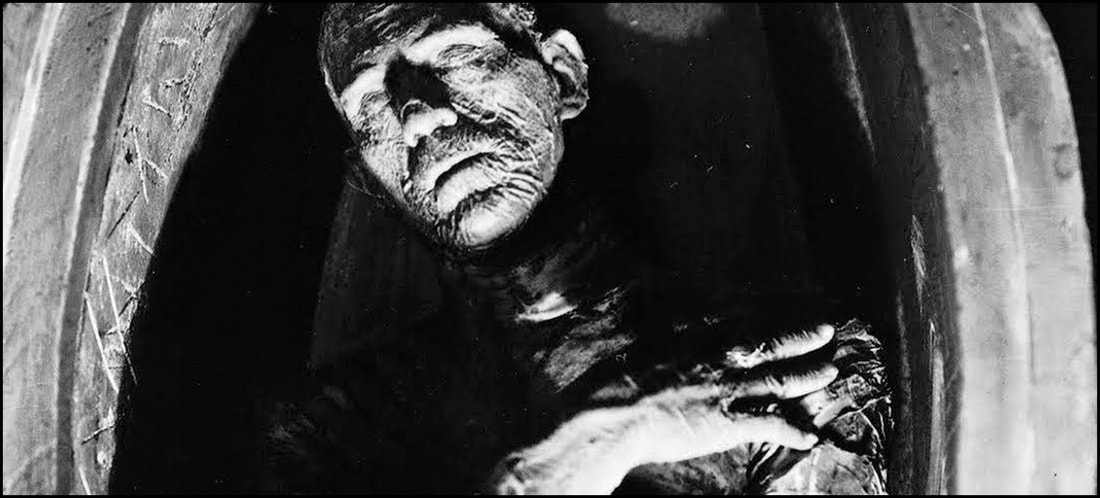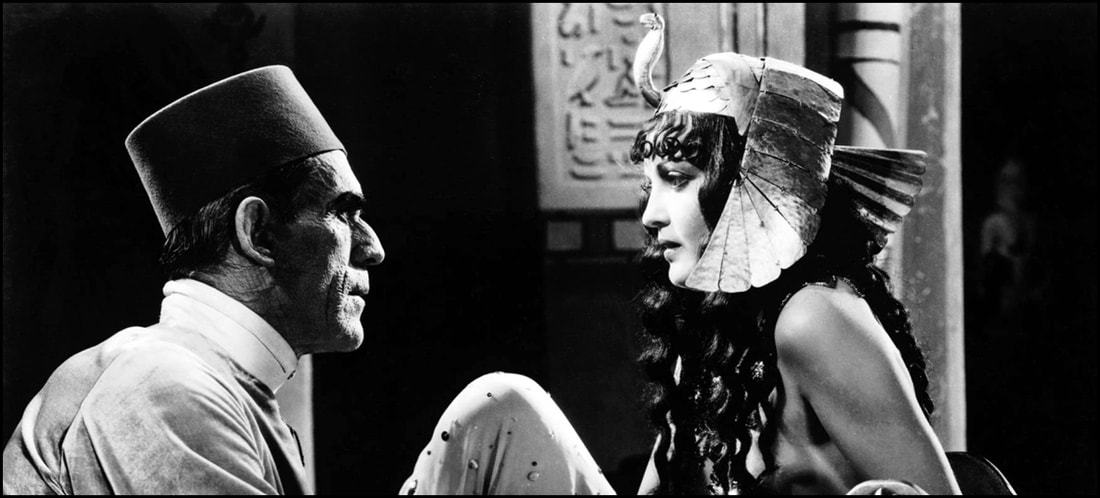As I’ve often said, monster movies – for me, that is – don’t even have to be great because even a bare bones serviceable yarn which hits all the basic monster requirements has enough foundation to pique my interest. While those conditions do vary from viewer to viewer, I’ve read some online commentary that suggests that the two big ticket items invariably show up on everyone’s lists: (1) creature design and (2) compelling story/mythology woven around the creature. So, yes, there are more, but if I concede critical ground so that I’m minimally in the same ballpark as others, then I’m happy to count myself in the wide, wide universe of those loving to be scared silly by any ogre a filmmaker ever captured in light and shadows.
Even under such a meager measure, 1932’s The Mummy comes up kinda/sorta short. Respectfully, there’s very little creature design work after the flick’s opening set-up. The overall look of the seminal beast is grand, but – ten minutes in – it’s all but gone from the journey as headliner Boris Karloff plays out the rest of the affair in some exceedingly pale makeover. While the mummy does have an incredible backstory – one all wrapped up in personal and social rejection as well as the loss of love – it appears so very late in the picture I can’t help but wonder why screenwriters Nina Wilcox Putnam, Richard Schayer, and John L. Balderston held up on the reveal for so, so, so long. In fact, introducing a few of those tidbits earlier would’ve improved some of the character relationships … but I don’t want to get too ahead of myself.
It's an imperfect addition to the Universal Monsters Movie Universe, but one that still deserves to remain on the pedestal alongside some of the filmdom’s most classic scares.
(NOTE: The following review will contain minor spoilers necessary solely for the discussion of plot and/or characters. If you’re the type of reader who prefers a review entirely spoiler-free, then I’d encourage you to skip down to the last few paragraphs for the final assessment. If, however, you’re accepting of a few modest hints at ‘things to come,’ then read on …)
From the film’s IMDB.com page citation:
“A resurrected Egyptian mummy searches Cairo for the girl he believes to be his long-lost princess.”
Confession time: by best estimates, it’s been an incredible four decades since I last watched The Mummy.
And, yes, this was a deliberate choice on my part. Having seen it twice in my youth that I can recall, my impression of it has never been all that favorable. It isn’t that I dislike it, because that couldn’t be further from the truth. The reality is that – as a monster movie – I’ve just never been all that moved by it. It’s not all that scary, and there’s so little investment and/or attention truly given to a monster, so what’s all the buzz about? At times, it really feels more like a haphazard magic movie than anything else (seeing as how the supposed curse plays out), so I’ve pretty much left it alone, instead watching damn near any newfangled iteration that’s come out on the big or small screen. (No, not a fan of the Brendan Fraser films, either, but that’s an entirely different discussion …)
What I find even more frustrating about the whole affair is that the audience really isn’t let in on what’s happening with the curse and the apparently seduction of Helen Grosvenor (played by Zita Johann) to very late in the film, leaving us to ‘fill in the gaps’ a bit too often in order to make sense of just how and why the lovely lady has been so easily co-opted by Karloff’s machinations. A bit more focus earlier on would’ve averted some of the confusion, and this could’ve been accomplished in any number of available exchanges (because there are plenty). But … as is? Well, it’s just a bit unclear until later.
What The Mummy does have consistently from start-to-finish is some very solid production detail. The sets are particularly impressive – even an obvious faux-Egyptian museum environment perfectly incorporates everything viewers would want to craft this atmosphere – and director Karl Freund uses light and shadow in equally clever ways to give even small scenes a welcome bit of texture. While performances are all good, it’s very clear that Karloff and Johann were the centerpieces to this elaborate event; at this point in his career, Karloff had probably forgotten more about commanding a close-up than most actors ever learn, and the story as conceived gives Johann equal balance, albeit her work is occasionally weighed down with some melodramatics of the damsel-in-distress. But a bit of extra focus here-and-there on the supporting players would’ve elevated this one beyond the murkiness that exists even to this day.
If nothing else, the film looks a helluva lot tighter, stronger, and more dramatic than its dialogue would have you believe, so kudos to the craftsmen for giving us something extra special with a feast for the eyes.
Where I personally struggle with embracing The Mummy as strongly as I have others in the Universal Pictures line-up is the fact that – setting aside the obvious atmospherics – its story just doesn’t resonate. Its monster – unlike Dracula, Frankenstein, or the Wolfman – never quite achieves mythic status, and too much of his impact comes from the recitation of the legend and so very little of what Karloff does onscreen. In that delicate balance of ‘telling’ versus ‘showing,’ I’ve always thought this Mummy showed too little, and that lessened the dark fairy tale quality that so winningly echoes from other creature features. It isn’t absent; it’s just very thin, making me care so little for who he is, where he’s come from, and what he’s trying to accomplish.
The Mummy (1932) was produced by Universal Pictures. The film is presently widely available for purchase and/or rental on a variety of internet streaming platforms. As for the technical specifications? While I’m no trained video expert, I thought that the sights and sounds to this classic monster movie were pretty fabulous. The production has some exceptional set decoration, and it all looks very good, even despite the obvious aging.
Recommended.
If I’m being perfectly honest about my ongoing love affair with all of the (original) Universal Monsters Universe, then I’d have to confess that The Mummy (1932) is only a passing flirtation … and even that’s owed to the flick’s solid production detail and an interesting (at best) performance from Karloff that anchors everything in here. I’ve always found its rewatchability pretty low as its 73-minute runtime never quite does all that much with the seminal monster, instead relying on Karloff to sell what sizzle there is under a mostly pasty guise. Good? Yes. Great. Meh.
-- EZ



 RSS Feed
RSS Feed